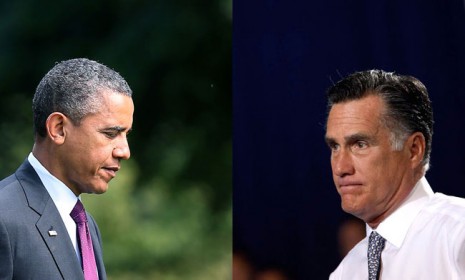Could the presidential race end in a tie?
This extraordinarily close battle could, theoretically, end with Obama and Romney deadlocked in the Electoral College. Just how far-fetched is that messy scenario?

A free daily email with the biggest news stories of the day – and the best features from TheWeek.com
You are now subscribed
Your newsletter sign-up was successful
With President Obama and Mitt Romney polling neck-and-neck in their race for the White House, conventional wisdom holds that November's outcome hinges on whether Obama or his GOP challenger fares better in a small number of crucial swing states. But what if neither candidate edges ahead to earn the 270 electoral votes needed to win, and both end up with 269? Number-crunching political watchers foresee several scenarios that could produce such a dead heat. Here, a guide to this nightmare possibility:
Is it really possible for a presidential election to end in a tie?
A tie is "the white whale of American elections: Elusive, mythical, and never realized," says Peter Hamby at CNN. But this year, the prospect that the nation's 538 electoral votes could be split down the middle is "startlingly real." Consider this scenario: "Romney tears up Obama's 2008 map and wins New Hampshire, Iowa, Ohio, Florida, North Carolina, and Nevada. Obama, meanwhile, keeps Colorado, Virginia, Pennsylvania, and Wisconsin in the Democratic column." Voila! Each candidate has 269 electoral votes.
The Week
Escape your echo chamber. Get the facts behind the news, plus analysis from multiple perspectives.

Sign up for The Week's Free Newsletters
From our morning news briefing to a weekly Good News Newsletter, get the best of The Week delivered directly to your inbox.
From our morning news briefing to a weekly Good News Newsletter, get the best of The Week delivered directly to your inbox.
Are there other plausible scenarios yielding the same result?
Yes, several. The "most likely combination," says Erin McPike at Real Clear Politics, would have Romney carrying every state John McCain won in 2008, which would give the Republican 180 electoral votes. If Romney also picks up Indiana (11), Virginia (13), North Carolina (15), Florida (29), Ohio (18), and New Hampshire (4), he'd have 270 electoral votes to Obama's 268. But if Obama can grab a single electoral vote in Nebraska, which has an "anomalous way" of divvying up its five electors, the race ends in a tie. In all, says Charles Mahtesian at Politico, "there are well over a dozen ways to get to a tie."
How likely is a tie?
It's certainly possible, but considering all the possible permutations, still somewhat unlikely. If I had to bet, says Nate Silver at The New York Times, I'd still forecast an Obama win, as our stats gave him a 65.9 percent of victory. And remember, two of the paths to a tie would require Democrats to lose blue-tinged Wisconsin and Pennsylvania, something Democrats insist is impossible.
A free daily email with the biggest news stories of the day – and the best features from TheWeek.com
What would happen in the event of a tie?
"A tie would set off a wave of constitutional and political mayhem that would make the 2000 Florida recount seem like a tidy affair," says CNN's Hamby. The campaigns would almost certainly challenge results in key states. Electors, who are usually anonymous, would be lobbied to change their votes. And if no electors flipped, the House of Representatives would have the final say, with each state's delegation casting one vote (the last such "contingent election" occurred in 1824, when none of the four candidates won a majority and the House elected John Quincy Adams, even though Andrew Jackson won the popular vote). Given this formula, Romney would be virtually assured of victory, with one hitch. The Senate, which might still be in Democrats' hands, would pick the vice president. "A Romney-Biden administration?" Hamby says. "No one's betting on it. But it could happen."
Sources: CNN, New York Times, Politico, RealClearPolitics
Read more political coverage at The Week's 2012 Election Center.